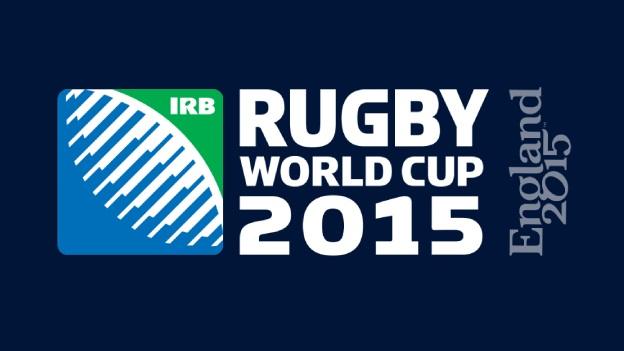Rugby World Cup 2015: Wales defy odds for 'biggest & best win'
- Published
- comments
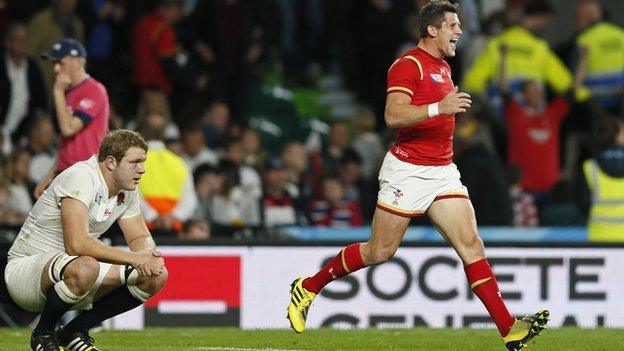
Wales overturned a 10-point deficit to win the crucial Pool A encounter
Sometimes there are games so gripping that hype is left looking lightweight. Sometimes there are contests so brutal that there are more men bloodied and broken than left standing. Sometimes teams refuse to be beaten, even when the scoreboard and odds and environment are all against them.
Saturday night at Twickenham was all that and more. Breathless chaos, impossible composure. A moment of brilliance, a litany of stupidity. Arguably the biggest and best win Wales have ever pulled off on foreign soil, indisputably the most devastating defeat of Stuart Lancaster's England regime.
How did Wales snatch it? In any normal victory over England - if there were such a thing - there would be those who couldn't care. All that matters is the win.
Except this time the style and circumstance will be essential to the celebration.
Biggar and better in second half
Ten points down at half-time, a scrum disintegrating, a line-out malfunctioning. Half a team out injured before the night had begun, their replacements succumbing the same way. England in charge, kicking their points, holding their line.
Some of it sprung from a change in tactics. Keep the ball in play. Take the set-piece out of the equation.
A lot of it came down to the dead-eyed kicking of Dan Biggar. Seven penalties kicked for the posts, seven successful. No Welshman has ever scored as many in a World Cup contest as his unblemished 23.
More on England v Wales: |
|---|
For the latest rugby union news, follow @bbcrugbyunion, external on Twitter |
With the deficit still seven points and less than 10 minutes remaining, in came the individual inspiration - Lloyd Williams, disappearing down a white-shirted cul-de-sac on the left wing, kicking cross-field with the same elan and accuracy as Didier Camberabero on this same turf 24 years ago to send Gareth Davies away for the critical try.
With the score locked at 25-25, a weary yet indefatigable Biggar nailed a monstrous penalty from almost halfway to complete the comeback.
All that, and then belief, and guts, and fitness, and fight. There were reasons everywhere for Wales to accept defeat. They would not take them.
It still should not have been enough. This was a match won in astonishing fashion but also lost in the way that can haunt teams and finish coaches.
Had you missed the entire match then the look on Lancaster's face afterwards would have told you everything you needed to know.
The match in numbers | |
|---|---|
Wales have now won on two of their last three trips to Twickenham. | Dan Biggar's 23 points was the most by a Wales player in a Rugby World Cup match. |
The three-point winning margin was the closest scoreline between the two sides at the Rugby World Cup. | The last time England surrendered as big a half-time lead was in February 2008, also against Wales. |
Unwanted infamy looms for Lancaster's men
This was the doomsday scenario for his side, a win over Australia now the only thing that stands between them and unwanted infamy as the first World Cup hosts in history to go out of their own tournament in the group stages.
It was also a collective failure of strategy, a second-half brain freeze that manifested itself in repeated penalties for exactly the same breakdown offence and came to a head in the decision, three minutes from time, to kick for the corner rather than take on the three points that would have rescued at least a draw.
For all the talk about the coach's controversial team selection, this was a match decided elsewhere. Owen Farrell was excellent, banging over all five of his penalties, adding a somewhat wobbly drop-goal and a simpler conversion. Sam Burgess bashed and crashed and slammed a little too.
Just before half-time, England led 16-6. They were dominant in the scrum, all over every line-out, winning quick ball and creating space out wide as their ball-carriers sucked in defenders. Ben Youngs was firing, Mike Brown scorching a trail.
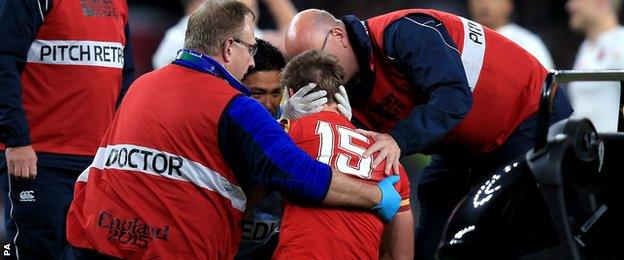
Liam Williams went off injured in the second half
Where did it go wrong for England?
Just after half-time they still led 19-9. With half an hour to go they had it held at 22-12. So where did it go?
In the head and in the hands. At ruck after ruck an Englishman would transgress, the whistle of Jerome Garces would trill and Biggar's boot made another dent in their lead.
England missed 17 tackles and conceded eight turnovers. Too often in a disintegrating second half they kicked possession aimlessly away. More critical were the 12 penalties, so many for the same offence.
Why not realise? Why not adapt? So much else that England had done was based on solid pragmatism: kick for territory, pick up points when deep in opposition territory, keep the defensive line-speed high and door tightly shut.
They could still have rescued it. A draw would have kept this most open of groups in the tantalising balance. Farrell had been faultless. So why gamble on something more?
Captain Chris Robshaw has been here before. With time running out against South Africa in the autumn of 2012 he instructed Farrell take a penalty that took his side to within a point, rather than going to the corner.
England mangled the re-start, ran out time and lost the match. Three years on he went the other way - red rather than black, twist rather than stick - and found the result the same.
Lancaster offered him precious little protection afterwards. He had been screaming from the bench to take the points that would have levelled it.
He may be screaming in his sleep for long dark nights to come. For all he has done with England, for all the dedication and thought he has put into his four years and the broken bridges he has mended between the country's elite players and its long-suffering support, it may all be crashing down around him.
Can England recover against Australia?
Sides have come back from calamitous defeats in the group stages before to flourish again at World Cups. Four years ago France were embarrassed by Tonga but went on to reach the final and be within a kick of winning the thing. Eight years ago England were blitzed 36-0 by South Africa yet fought back to somehow meet the same opponents again in the final.
Neither had to beat a side as accomplished as the Wallabies just to make it into the knockout stages.
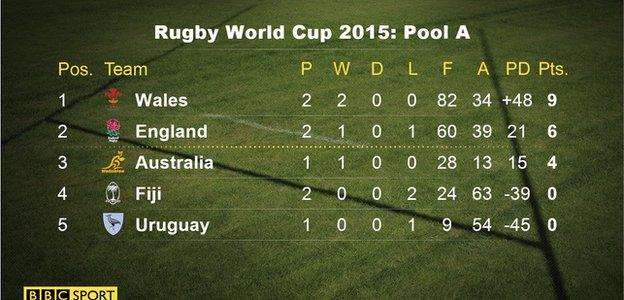
Lancaster's team, in every Six Nations and every autumn series, has failed at least one big test. The wriggle-room has now gone. Another now-characteristic failure and they will be gone.
Quite what happens to Wales next is another matter. With Scott Williams, Liam Williams and Hallam Amos added to an injury-list that already included two props, a winger, a first-choice scrum-half and a Lions full-back and centre, and a bench so bare that they finished this match with a wing at centre, a scrum-half on wing and a patched-up fly-half at full-back, this victory has come at a cruel price.
That is for another night and another morning.
As midnight passed to the sounds of Hymns and Arias being sung from the stadium bars and early morning arrived to men in red dancing down the dark streets of south-west London, it was all about one match: a win like no other, a night to never forget.
- Published26 September 2015

- Published27 September 2015
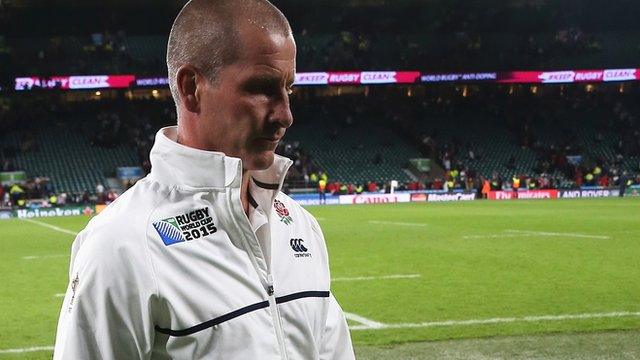
- Published27 September 2015
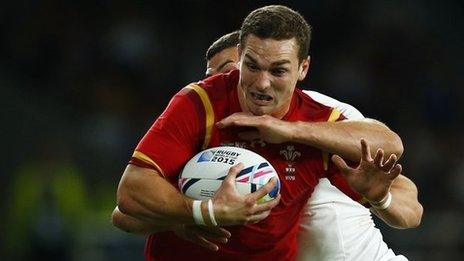
- Published24 September 2015

- Published18 September 2015
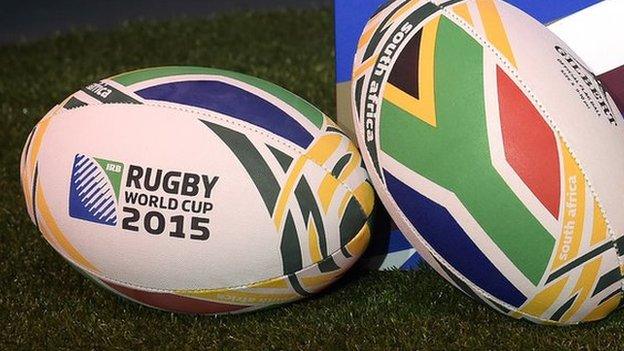
- Published3 February 2017

- Published14 September 2016

- Published15 February 2019

- Published25 September 2015
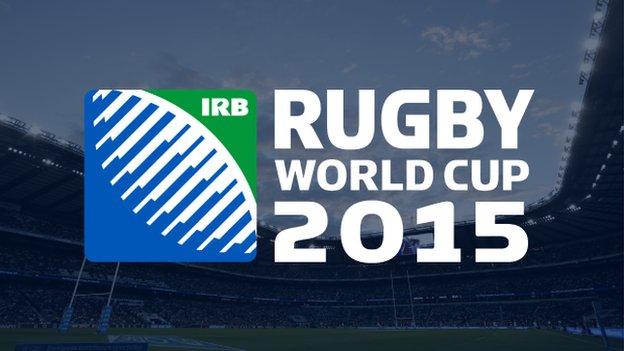
- Published8 September 2015
